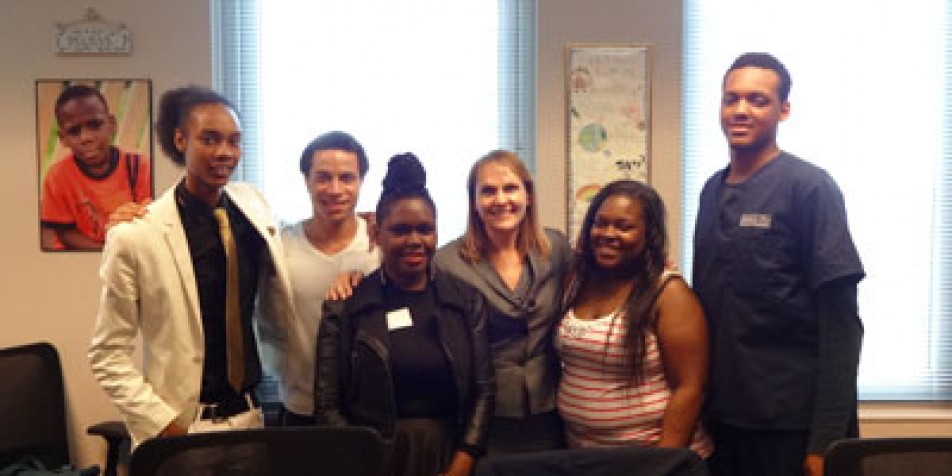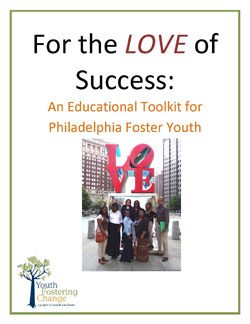Become a Juvenile Law Center Youth Advocate!

Above: Youth Fostering Change Youth Advocates meeting with former Philadelphia Department of Human Services Commissioner Anne Marie Ambrose in February 2014
Juvenile Law Center is currently accepting applications for young people who have been involved in the juvenile justice or child welfare system to join our youth engagement programs, Juveniles for Justice and Youth Fostering Change! See below for more information on being a Youth Advocate and to download an application.
What are Juveniles for Justice and Youth Fostering Change?
Juveniles for Justice is a group of young people, or Youth Advocates, who have been involved with the juvenile justice system. Youth Fostering Change is a group of young people, or Youth Advocates, who have been involved in the child welfare system. Both groups work to create change that improves the lives of youth who have been in the system.
What do these groups do?
Each year, Youth Advocates learn about the juvenile justice or child welfare systems and, based on this information and their own experiences, create a project to improve the system. As part of their campaign, Youth Advocates present their experiences, opinions, and project to different officials and workers such as judges, lawyers, probation officers, and policymakers to promote their ideas for change.
How often do Youth Advocates meet?
Youth Advocates meet once a week from September to June. Sessions last two hours. Youth Advocates are required to attend and participate in each session.
Are Youth Advocates paid?
Yes. Youth are paid for each session and receive stipends for additional work.
How do I become a Youth Advocate?
Fill out one of the applications below and drop it off or mail it to Cathy Moffa, Juvenile Law Center, 1315 Walnut Street, 4th Floor, Philadelphia, PA 19107. You can also email your application to [email protected] or fax it to 215-625-2808. Applications are due by Saturday, August 30th.
|
|
|
|
Examples of Past Projects
Juveniles for Justice: Expunging Your Juvenile Record
In 2013-2014, Juveniles for Justice Youth Advocates focused on promoting awareness of the impact of juvenile records and how to expunge, or destroy, them. They created an informational card for youth with information about the expungement process, and also created this video to spread awareness of the importance of expunging juvenile records. Public defenders at the Defender Association of Philadelphia will be using this video in trainings and presentations for attorneys.
[video:http://youtu.be/gh6_MVLyBN0]
Youth Fostering Change: "For the Love of Success: An Educational Toolkit for Philadelphia Foster Youth"
Youth Fostering Change Youth Advocates devoted their 2012-2013 year to improving educational outcomes for older youth in foster care. As part of their project, they created "For the Love of Success: An Educational Toolkit for Youth in Philadelphia."
This toolkit is designed to help youth in the child welfare system graduate from high school and get into college, based on the Youth Advocates' experiences in care. As foster youth, many Youth Advocates felt unprepared to succeed in high school and to pursue post-secondary opportunities.
The first section of the toolkit, "Getting to Know You," identifies the youth's needs, strengths, skills, and interests. It helps youth create short- and long-term goals to map out a plan for success. The second section the toolkit, "Planning it Out," helps foster youth understand what they have to do to get into college. It includes information on finding colleges, how to apply for college, and how to seek financial aid.
The Philadelphia Department of Human Services generously printed copies of the toolkit and is distributing it throughout Philadelphia.
Download "For the Love of Success: An Educational Toolkit for Youth in Philadelphia" >>
For more information on Juveniles for Justice or Youth Fostering Change, contact Cathy Moffa at [email protected].


